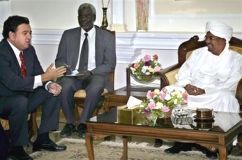US governor sees some progress in Sudan’s stance on Darfur
Jan 08, 2007 (KHARTOUM) — U.S. governor and potential presidential candidate Bill Richardson on Monday pressed Sudan President Omar al-Bashir to open the wartorn Darfur region to U.N. troops, part of a global push for an elusive peace in the African nation.
 Richardson met privately with al-Bashir for nearly an hour at his mint green residence and emerged talking progress. He provided no specifics, but the two plan to meet again Wednesday and will issue a joint statement.
Richardson met privately with al-Bashir for nearly an hour at his mint green residence and emerged talking progress. He provided no specifics, but the two plan to meet again Wednesday and will issue a joint statement.
“The meeting was good. We made some progress,” Richardson told local reporters, choosing to keep details private as negotiations continued.
The trip highlights the Democratic New Mexico governor’s likely 2008 presidential bid and could be a boost for his candidacy, drawing attention to his extensive foreign policy background, including his tenure as U.S. envoy to the United Nations during former U.S. President Bill Clinton’s administration.
Bolstering Richardson’s diplomacy is the newfound Democratic power in Washington, with his party in control of Congress. His voice adds to similar pleas from U.S. President George W. Bush’s administration.
In Washington, U.S. State Department spokesman Sean McCormack said Richardson’s visit underscores that al-Bashir’s government is “getting the message from multiple directions about what they need to do.”
McCormack shrugged off any suggestion that the administration resents the private diplomatic efforts of a potential Democratic presidential candidate.
“I wouldn’t call it freelancing,” he said.
McCormack said the administration’s new special envoy for Sudan, Andrew Natsios, had met with Richardson before his trip. Natsios has experienced a number of frustrations in his initial dealings with the al-Bashir government and is now seeking Chinese help to apply economic pressure on its Sudanese trading partner.
Back at his hotel, Richardson told an Associated Press reporter traveling with him that he and al-Bashir discussed the U.N. peacekeeping force, a cease-fire, protection for humanitarian groups working in the region, increasing sexual violence against refugees and a potential conference with rebel leaders.
Al-Bashir was unavailable to reporters.
The Sudanese government signed a peace agreement with some rebels last May in Abuja, Nigeria, but most rebel faction leaders rejected the accord. A cease-fire was quickly broken and violence subsequently increased in Darfur.
“We’re going to press the rebels to participate not just in the Abuja process, but in the cease-fire and protecting humanitarian groups,” Richardson said. He said he and al-Bashir discussed how to bring those who refused to sign on to Abuja into the process.
He discussed the same issue later with Minni Minnawi, the leader of the rebel Sudan Liberation Movement that signed the agreement and subsequently became a presidential assistant. Minnawi expressed disappointment that the government has not yet disarmed the militias and told Richardson if the al-Bashir’s government does not honor its commitments, there will be regime change. Minnawi did not elaborate.
Yet he encouraged other rebel leaders to sign onto the agreement and said he would adhere to it. “We are respecting the cease-fire and we will continue to implement it,” Minnawi said in an interview at him home in Khartoum, where other Darfurians sat under tents and cooked food in the yard.
Al-Bashir has been isolated internationally over Darfur, avoiding intense global pressure to allow 20,000 peacekeepers in to protect 2.5 million people who have been uprooted during the 4-year-old conflict. The U.N. Security Council voted in August to send in the peacekeepers to replace the underpowered African Union force of 7,000 troops.
His government has a record of appearing to accede to international pressure and then backtracking. Last month, then-U.N. Secretary-General Kofi Annan announced that Sudan had provisionally agree to accept a staggered version of the U.N. plan, but days later it became apparent that Khartoum would accept only small numbers of U.N. military and civilian advisers.
In Khartoum, Richardson also met with Sudanese foreign minister Lam Akol, bringing along humanitarian workers that included one representative of the Save Darfur Coalition. The coalition organized the trip and has been instrumental in bringing attention to the crisis and criticism on al-Bashir’s government.
Richardson hopes to make progress with the other parties in Darfur, where he plans to travel Tuesday. He is due to meet with rebel leaders, but has been warned that it is growing more difficult to determine who controls the increasingly fragmented people.
He also plans to meet with the commander of the overwhelmed African Union force, which is having difficulty controlling the growing violence.
On Monday, the AU condemned reports of air bombardments on Friday of two locations in north Darfur by the Sudanese government, which has accused the National Redemption Front, a coalition of rebels who rejected the peace accord, of amassing weapons and fighters near one of the locations close to Sudan’s border with Chad.
The government and the NRF could not immediately be reached for comment.
“Continued violation of cease-fire is a stumbling block to the ongoing efforts at seeking a durable cease-fire,” the AU said in a statement.
Sudanese troops and the Arab tribal militia known as the janjaweed have been fighting Darfur’s ethnic African rebels, who revolted against what they saw as decades of neglect and discrimination by the Khartoum government. More than 200,000 people have been killed, and President Bush has labeled it a genocide.
(AP)
